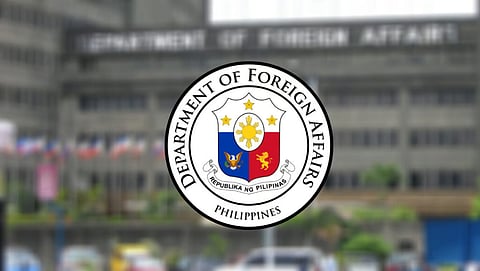
- NEWS
- the EDIT
- COMMENTARY
- BUSINESS
- LIFE
- SHOW
- ACTION
- GLOBAL GOALS
- SNAPS
- DYARYO TIRADA
- MORE

The Department of Foreign Affairs on Monday said it will investigate the “illegal and unlawful activities” of foreign diplomats in the country.
The move came following reports that a diplomat in the Chinese Embassy in Manila allegedly taped his conversation with a member of the Armed Forces of the Philippines.
According to the DFA, it would “undertake the necessary action in line with existing laws and regulations.”
In an apparent response to the calls for the expulsion of Chinese diplomats, the agency reminded foreign diplomats in the country to remain “professional.”
“Foreign diplomats accredited to the Philippines are accorded the necessary liberties to conduct their diplomatic duties with the expectation that they, in turn, will conduct their diplomatic activities with the highest standards of integrity and professionalism, in pursuit of common interests and mutually beneficial outcomes,” it said in a statement.
The DFA reiterated that being a strong advocate of rules-based governance, the Philippine government is “firm and united in respecting and upholding the rule of law in both the domestic and international milieus.”
“It is in this context that the Philippines—as a responsible member of the international community of nations—has consistently called for adherence to international law, including the United Nations Charter, the Vienna Conventions governing inter-state relations, and in the maritime domain the 1982 UNCLOS, among others,” it said.
Last week, the Chinese Embassy in Manila released a recording of a supposed two-minute phone call between one of its diplomats and Admiral Alberto Carlos, commander of the AFP Western Command, about a so-called new model agreement on the West Philippine Sea.
Defense Secretary Gilberto Teodoro and National Security Adviser Eduardo Año called for the expulsion of the Chinese diplomat behind the supposed phone call for “potentially violating the Anti-Wire Tapping Act and breaching diplomatic protocols and conventions.”
The Chinese Embassy in Manila has yet to comment on the new developments.
China claims a vast swath of the South China Sea, including areas well within the Philippines’ exclusive economic zone (EEZ) as defined by the UN Convention on the Law of the Sea (UNCLOS).
This includes features like Ayungin Shoal, the location mentioned in the alleged transcript released by the Chinese Embassy.
The Philippines, on the other hand, maintains a small military presence in the West Philippine Sea to protect its territory and enforce its rights under UNCLOS. China views this presence as a provocation and has repeatedly harassed and intimidated Filipino vessels and personnel.
The DFA stressed that the Philippines is a responsible member of the international community of nations and has consistently called for adherence to international law, including the United Nations Charter, the Vienna Conventions governing inter-state relations, and the 1982 UNCLOS.
